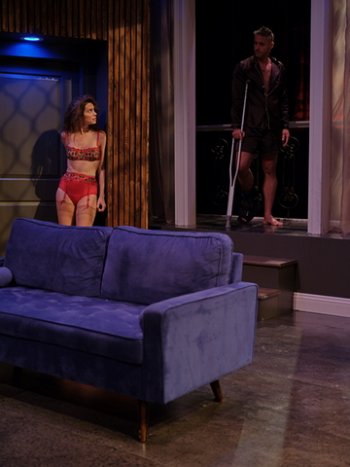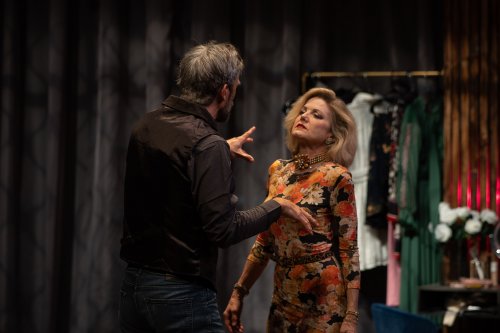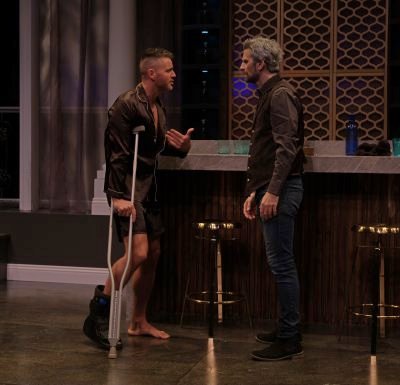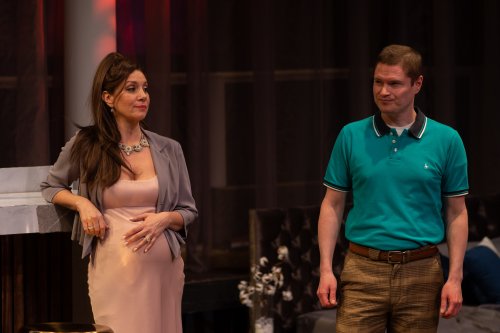Cat on a Hot Tin Roof
An encore showing of the summer 2022 Ruth Stage production comes in almost completely recast, but with more Southern Gothic bite this time around.

Courtney Henggeler and Matt de Rogatis in a scene from the Off Broadway revival of Tennessee Williams “Cat on a Hot Tin Roof” at the Theatre at St. Clement’s (Photo credit: Max Bieber)
[avatar user=”Tony Marinelli” size=”96″ align=”left”] Tony Marinelli, Critic[/avatar]
The Toms River, New Jersey company known as Ruth Stage was the first theatre company ever granted permission from the Tennessee Williams estate to mount an off-Broadway production of Cat on a Hot Tin Roof. That production played out its limited engagement, but apparently the producers felt they still had more to say. An encore presentation has opened with all but three of the roles recast, and to say the added effort was worth it is an understatement.
The first act features what is virtually a pages-deep monologue loaded with exposition for the character of Maggie (the “Cat” of the title), occasionally interrupted with minor commenting from her husband, Brick, in between his attempt to drink himself into a stupor in their bedroom. As played by Courtney Henggeler, a star from the Netflix series Cobra Kai making her New York stage debut here, we are treated to what amounts to a desperate Victoria’s Secret floorshow. Returning to their bedroom to change after getting her nieces’ and nephews’ food on her at dinner, she spends the bulk of the scene in red bra and panties. This is meant to get a rise out of her husband but he has other things on his mind, like drinking and mourning the death of his best friend with whom he may or may not have had a clandestine homosexual relationship. Maggie never loses track of her ulterior motive – to become pregnant with Brick’s child who will one day be the heir apparent to a 28,000 acre plantation. Ms. Henggeler gamefully plays her cards of jealousy, their mutual crave of being the center of attention, and their shared contempt for Brick’s brother Gooper, sister-in-law Mae and their hideous offspring. Whereas her predecessor in the role gave the same value to all the content of the first act speeches, Ms. Henggeler is encouraged by and thrives on the dramatic potential in the Southern belle that can turn on a dime into a hellcat.

Frederick Weller and Alison Fraser in a scene from the Off Broadway revival of Tennessee Williams “Cat on a Hot Tin Roof” at the Theatre at St. Clement’s (Photo credit: Miles Skalli)
Another key addition to the cast is the solid Frederick Weller as Big Daddy, Brick’s father, who is duped into thinking his cancer scare was only a scare and not the actual death sentence it is. Past Big Daddies are legendary – Burl Ives, Charles Durning, Ned Beatty and James Earl Jones – all men who seemed to take up great space on the stage (a nice way to say they never skipped a meal). In Frederick Weller we have a completely new take on the role – with his hair silver-tip frosted looking more like the mane of a rock star than a senior citizen and wearing tight jeans and a vest that shows off his physique, we understand only too clearly the implications when Maggie tells Brick she has caught Big Daddy’s eyes roaming to her bosom when they spoke. Perhaps she can still bring a child into the Pollitt family, but it might not have to be Brick’s.
Mr. Weller’s long Big Daddy-and-Brick scene, the centerpiece of the play, is now a touching display of a man trying to get his son to rejoin the living by taking control of his life again as when he was the young charismatic football hero that everyone worshipped. His admission of his fear of death is poignant set amidst a culture where boys don’t cry or show their feelings ever. Mr. Weller’s predecessor in the role wallowed in disinterest in this scene, a sin that is inexcusable in that the father-son scene is a golden opportunity for an actor to show dimension and a palette of emotions that would otherwise be mired in caricature. With Mr. Weller, we are as hurt as he when he storms out screaming, “Liars! All liars!” to end the act.
Repeating his performance as Brick, Matt de Rogatis now revels in his scenes. Whereas in the previous incarnation he was appropriately sullen, his brooding is now more visually bold and seething and his outbursts are more vocally commanding. It is certainly because Ms. Henggeler and Mr. Weller give him more to play off of. Seeing Big Daddy and Brick quickly move from quiet and pensive to passionate and poised for outbursts, we now see how, as they say, the apple doesn’t fall far from the tree. The previous second act ended with an uncharacteristic flatness, where as now it is electric.

Matt de Rogatis and Frederick Weller in a scene from the Off Broadway revival of Tennessee Williams “Cat on a Hot Tin Roof” at the Theatre at St. Clement’s (Photo credit: Mikes Skalli)
Also repeating her performance as Big Mama, Alison Fraser has quicksilver moments in her interactions with Mr. Weller that are more compelling and thoughtful than they were with Mr. Weller’s predecessor. That energy now carries over even into her exchanges with Mae, Gooper, Doc Baugh and Reverend Tooker.
Adam Dodway and Christine Copley as Gooper and Mae are sublime in their attempt to manipulate the outcome of Big Daddy’s fortune. Even here we see how roles that are traditionally played “close to textbook” can still be played with an emotional depth, despite the fact the audience is on to their shenanigans from the outset of our first seeing them on stage. The audience can almost be heard muttering, “Nice try,” as Gooper puts his outline for the new management of the property back into his briefcase, never to be seen again. Ms. Copley is a superb foil to Ms. Henggeler when you consider their characters are very much cut from the same Steel Magnolia cloth – from debutante to homecoming queen to proper wife to ultimately the Southern version of a tigress…or soccer mom.

Christine Copley and Adam Dodway in a scene from the Off Broadway revival of Tennessee Williams “Cat on a Hot Tin Roof” at the Theatre at St. Clement’s (Photo credit: Miles Skalli)
The scenic design of Matthew Imhoff radiates “very well-off Southern White trash” with a couple of problems that should have been given more thought – a shower directly behind a centered bar makes little sense as does Mr. de Rogatis needing to change into his silk pajamas out on the balcony. If ever there was a need for a suggested en suite bathroom, this was it. Christian Specht’s lighting design is at its best in creating mood during the fireworks going off during the father and son scene. But here too, act endings were abruptly executed with very unnatural lighting changes that would have been less unsettling as simple fades. The costume design is now attributed to Ruth Stage, perhaps suggesting it was done more by committee than by the costume designer of the original run. Tomás Correa’s sound design is unobtrusive until we get to the storm scene late in the play. At times, it bordered on the obstructive, preventing the audience from hearing the actors engaged in their scene.
Director Joe Rosario gives particular attention to the intimate moments this time around. Despite the fact a lot of the audience members are already familiar with the plot, character objectives are more clearly defined now. With that, subtlety in playing certain moments is a relief compared to the steamrolling ahead in Act One in the previous production. Whereas that is easily attributed to an actress’s inexperience, some of that fault is that of the director, just as he gets the credit for the fine work we see now.

Matt de Rogatis in a scene from the Off Broadway revival of Tennessee Williams “Cat on a Hot Tin Roof” at the Theatre at St. Clement’s (Photo credit: Max Bieber)
Two particular moments underline the fine work with the new cast – as Big Mama exits with the untouched birthday cake, she replies to Big Daddy’s questioning of her love with “And I did, I did so much, I did love you! I even loved your hate and your hardness, Big Daddy!” to which he replies “Wouldn’t it be funny if that was true.” In the closing moment of the play, after Maggie’s announcement of pregnancy to the whole family, she has a rare intimate moment with Brick, “Oh, you weak people, you weak, beautiful people who give up! What you want is someone to take hold of you…gently, gently with love. I do love you, Brick, I do!” to which he responds “Wouldn’t it be funny if that was true?” Like father, like son.
While it may have appeared a huge gamble to mount this Cat again, the results are so well worth it. While other productions of Cat on a Hot Tin Roof have been mounted as star vehicles for actors whether they were right for the roles or not, this new Ruth Stage production brings it back to what the playwright originally intended – an incredibly solid ensemble piece. Here we see it as we’ve come to know it – one of the finest American plays of its generation. It is unequivocally a must-see!
Cat on a Hot Tin Roof (through March 31, 2023)
Ruth Stage in association with Joseph Grand
Theatre at St. Clement’s
423 West 46th Street, in Manhattan
For tickets, visit http://www.telecharge.com
Running time: two hours and 45 minutes including one 15 minute intermission and one five minute pause






Leave a comment